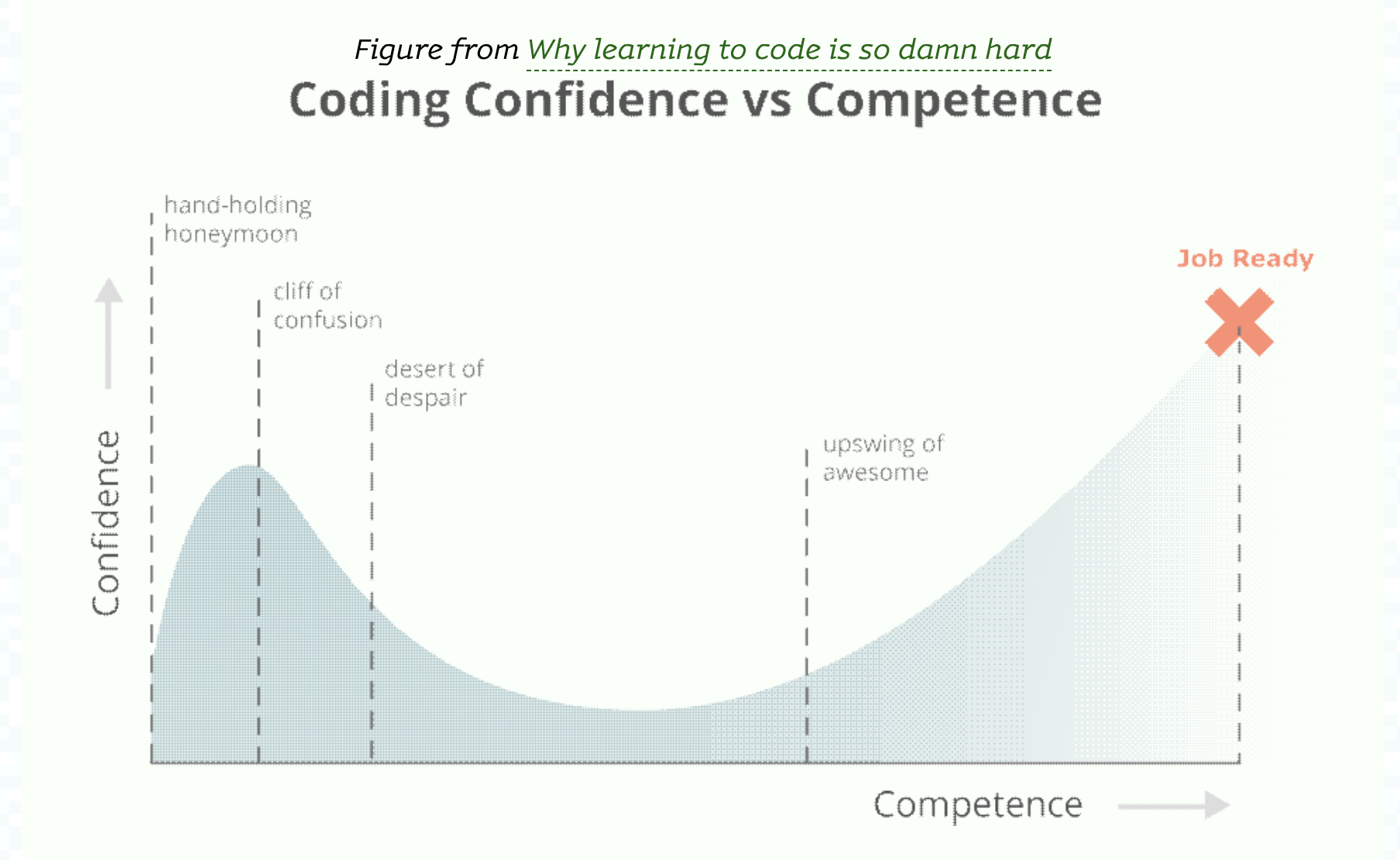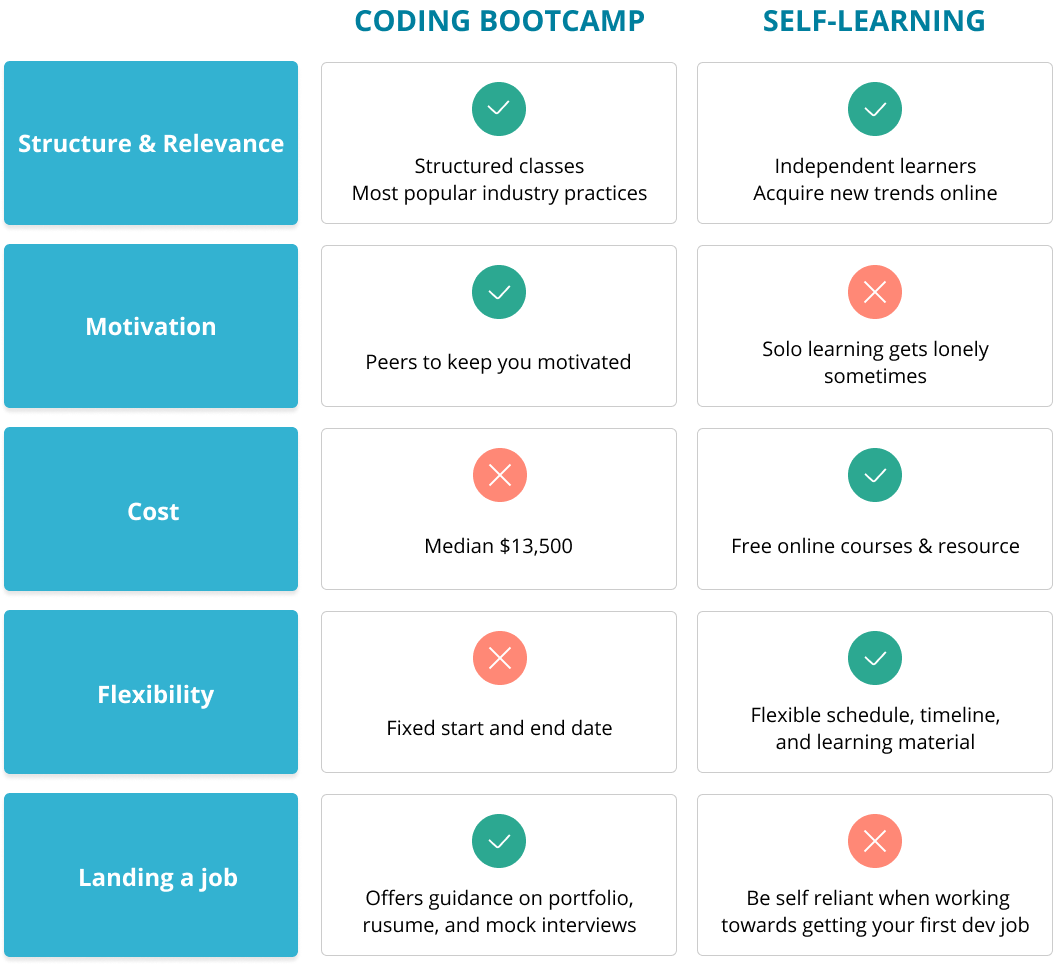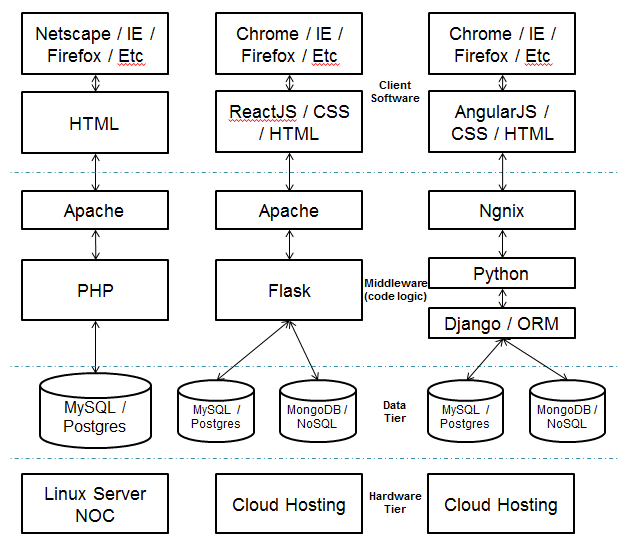If you’re considering switching careers to become a developer, you’ve probably spent hours researching bootcamps and other learning options, such as online courses and various self-learning methods. At the core, what you may actually be asking is: are coding bootcamps worth it or is self-learning more suitable?
In this article we’ll help you figure out if full-time onsite coding bootcamps or self-learning fit your learning needs better by comparing these five factors:
- Structure and industry relevance
- Motivation
- Cost
- Flexibility
- Possibility of landing a job
We’ll take a closer look at some of the pros and cons under each category. Hopefully we will get you one step closer to taking that first step in your programming journey!
Short on time? 👉 Jump to the summary table.
Structure & Industry Relevance
Full-time onsite bootcamps are a more organized style of learning whereas self-learning allows you freedom in building your own curriculum. In this section, we will compare the structured vs. unstructured aspect, and how easy it is to stay updated with the latest programming knowledge.
Bootcamps
Onsite coding bootcamps are structured classes with a set curriculum taught by a dedicated teacher and a few teaching assistants. Most coding bootcamps focus on web development holistically. This means you’ll learn a variety of technologies, including the latest industry knowledge.
In the bootcamp, you likely have a daily planned module and weekly goals. Classes can range from learning the foundations to building your own web applications. It’s common to learn basic programming languages such as JavaScript, SQL, Python, and some common industry practices, such as unit testing and the agile methodology.
Bootcamps are specifically designed to help you get a developer job after graduation. This means that the material will be tailored to the knowledge and skills that a software developer will need in the real world.
Self-learning
With self-learning, the structure is up to you. You can choose to set a strict schedule or give yourself more flexibility. You can also plan when, where, and how you want to acquire new programming knowledge.
For example, if you are learning Javascript from scratch, this might be what your curriculum looks like:
If you already know the basics and want someone more experienced to look through your projects or answer your questions, you can use platforms like Codementor (hey, that’s us! 😉)
to find mentors specialized in Javascript.
9 Ways A Mentor Can Advance Your Programming Journey
The verdict 📣 : A tie
As long as you understand your goals, your availability, and your learning style, structured and unstructured learning can be equally powerful. While structured bootcamps may save you time and energy by providing you with a set curriculum and industry knowledge, there is less freedom in deciding what and how you want to learn. On the other hand, self-learning would give you more flexibility, but could lack the structure and boundaries that might be helpful.

Motivation
Learning to code can be overwhelming. How you keep up the momentum, stay curious and motivated, and continue to advance your knowledge is a skill in itself. As shown in the graph below, you are likely to build up a sense of confidence during the honeymoon phase, and just when you think you’ve gotten through the learning curve, you enter this cliff of confusion and go downhill from there. This is where many people give up, but once you push through, it’s uphill from there.

In this section, we will take a closer look at the motivation factor.
Bootcamps
With a set curriculum, full-time onsite coding bootcamps create a learning environment where everyone learns the same information and works on projects at the same time. You feel a strong sense of belonging to this community of peers as everyone works toward the same goal: to become a software developer.
While your cohort and classroom can keep you accountable and motivated, it could also do the opposite. You could be distracted by the social environment, discouraged by others who seem to be ahead of you, or overwhelmed and drained by the heavy workload. While there are structures to help you stay motivated in bootcamps, it is not always a given.
Self-learning
For some, it is much easier to learn independently because you can set your own pace and not be bound by a structured curriculum and strict deadlines.
However, the down side of teaching yourself is that you might lose motivation, feel isolated, or feel lost without a clear roadmap. One way around this is to find an accountability partner, mentor, or peer to work with to stay motivated. As accountability is not inherently built into self-learning, staying motivated may be extra challenging. The journey for you to become a developer could take longer, and you may experience several dips throughout your learning journey.
The verdict 📣 : Coding bootcamps
Social interactions and the right amount of competition and mutual encouragement will help you thrive. Joining a cohort of students can keep you motivated and give you the push you need when you feel like giving up.

How To Improve Your Programming Skills As Developers and Non-Developers
Flexibility
Who doesn’t love a flexible schedule? We all want to be able to work, rest, eat, and set our own schedule. If you attend an in person bootcamp, your schedule is set for you, whereas you can maintain a high level of freedom and flexibility with self-learning.
Bootcamps
With full-time onsite bootcamps, you set aside everything in your life and focus on the course for roughly 3.5 months. You have a fixed start and end date, and a set schedule for each day. You dedicate most of your time to the course and sacrifice flexibility. The guarantee is, at the end of the course, you should have the skills and a solid portfolio to prepare you for your first developer job.
Self-learning
Self-learning is considerably more flexible as you get to set your own schedule. You aren’t bound by potential commute, class-attending, and group project time. You can set a learning schedule around your work hours. You are the main decision maker, and can decide on the topics you want to learn, how deep you want to go, the projects you want to work on, and adjust them at any time.
The verdict 📣 : Self-learning
Self-learning is the best learning option for you if you value and prioritize flexibility. Other than a flexible schedule, you also have the maximum flexibility to choose the material and people you want to learn from.

Cost
In 2021, the average annual salary of a software developer in the United States is $86,523, with the top 75th percentile making around $100k a year. How much are you willing to spend to have a career in software development?
In this section, we’ll look at the cost of joining a bootcamp and self-directed learning.
Bootcamps
To join a full-time onsite coding bootcamp, you’re looking at around $13,500 (median bootcamp tuition in 2020) for a roughly 14-week period. While it is more affordable than getting a 4-year or 2-year computer science degree, for some, this is a considerable sum of money and time invested into a career they’re not sure will work out for them.
Self-learning
With all the free resources online, such as courses, books, tutorials, or even talks, it’s possible to learn programming completely free of charge. You can also pay a few hundred dollars for an online course from platforms like Udemy, and Educative, or for subscription-based learning options, such as Frontend Masters and Treehouse.
The verdict 📣 : Self-learning
From fully free resources, to investing hundreds of dollars into resources of your choosing, self-learning is much more affordable. You can continue to learn at your own pace and pick up new skills according to your own financial ability. With coding bootcamps, you have to decide whether it is cost effective for you for the fixed price and timeframe.

Landing a job
If you’re learning programming to switch careers, you should consider how likely and how quickly you can find a developer job with bootcamps and self-learning.
Bootcamps
The goal of a coding bootcamp is to help you land a software developer job. Bootcamps will require you to complete a resume and portfolio by the end of the program. They will also provide career-focused resources, such as career counselors. Some even have “hiring days” or similar events where students can present their portfolio and attend interviews with the bootcamp industry partners.
Self-learning
As career resources are not provided to self taught developers, you’d have to take on the sole responsibility of preparing for and finding your first developer job. There are plenty of resources online dedicated to helping people find their first developer job. For more personalized help, you can consult developers in the industry for tips on landing your first job.You can also connect with mentors or senior developers for portfolio feedback and mock interviews.
The verdict 📣: Bootcamp
A coding bootcamp is familiar with what the industry is looking for and has experience helping students switch careers. Naturally, they have a better idea of what portfolios would work, what your resume should include, and other career resources you might need to kickstart your developer career. The added guidance is especially helpful when you’re switching careers.

Conclusion
Hopefully we’ve given you a bit more insights on two of the methods you could choose from. There are many many different ways to learn programming, what’s most important is understanding your own needs and goals and choosing a learning style that suits you best.

Regardless of which route you choose, you can always find an accountability partner or a coding mentor to support you through your journey. Not to mention, programming is a lifelong journey for all developers. A coding mentor can:
- Continue to encourage you even after you graduate from a coding bootcamp.
- Provide you technical and career advice.
- Share their experience and the latest trends in the tech industry.
Join discussion with other mentors and users on 👉 Getting into tech without a Computer Science degree
Have you gone through a coding bootcamp or are you a self-taught developer? We’d love to hear what worked for you and what didn’t. Comment below to let us know!






